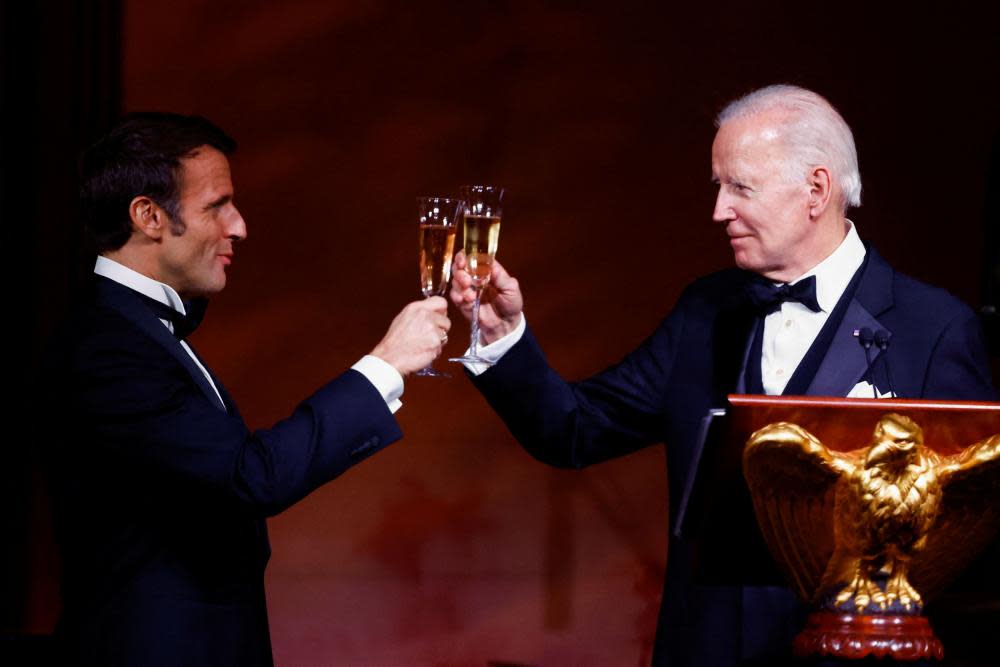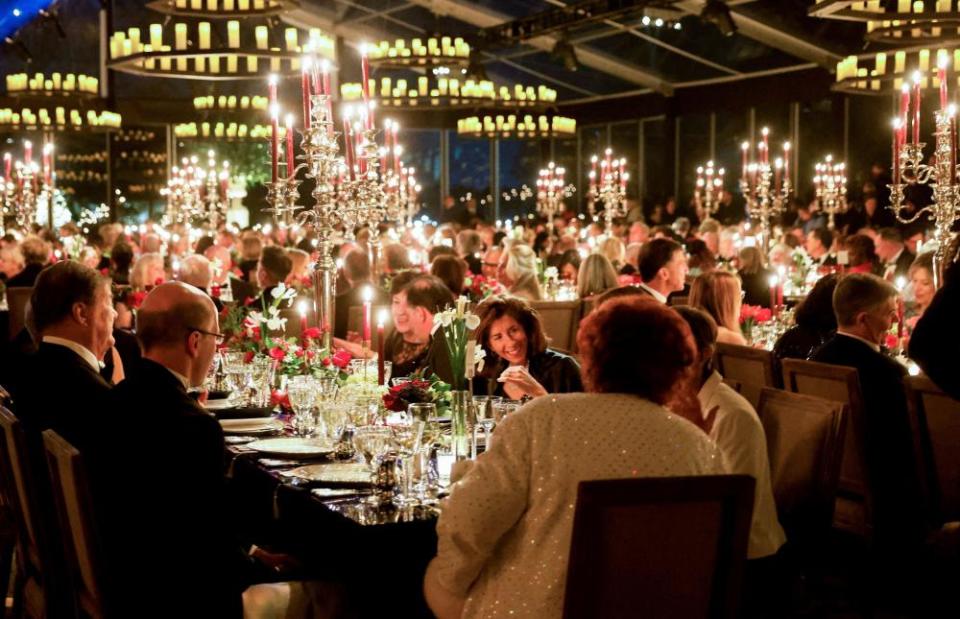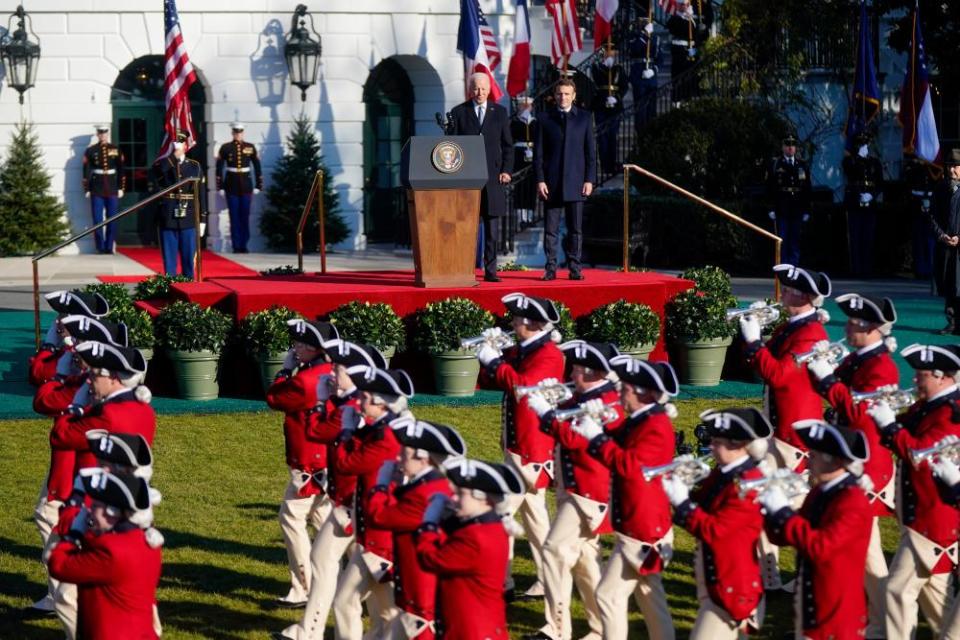Biden attempts to restore America’s global standing with state dinner pageantry

- Oops!Something went wrong.Please try again later.
- Oops!Something went wrong.Please try again later.
- Oops!Something went wrong.Please try again later.
- Oops!Something went wrong.Please try again later.
It was the night food porn returned to the White House. In a heated tent on the south lawn, political leaders, business titans and Hollywood stars feasted on butter poached Maine lobster, American Osetra caviar, calotte of beef with shallot marmalade, triple cooked butter potatoes and artisanal cheeses.
Joe Biden, a teetotaller reportedly drinking ginger ale, and French president Emmanuel Macron, wielding a flute of California brut rosé, wore tuxedos and offered toasts to their friendship. “Et laisse-moi dire, vive les États-Unis d’Amérique, vive la France, et vive l’amitié entre nos deux pays,” Macron said.
Related: Biden tells Democrats to revise primary calendar to boost Black voters’ voices
At Washington’s first state dinner since September 2019, the projection of unity – and restoration of normality – was unmistakeable. Congressman James Clyburn, who was among more than 338 guests under the chandeliers, said: “To see Macron reach in his pocket and pull out the US constitution and wave it, saying ‘We the people’, I thought was a tremendous gesture.”
The handshakes and embraces between America’s oldest president and France’s youngest were a vivid illustration of Biden’s efforts to restore the US’s standing in the world and heal relations with old allies shaken to the core by former president Donald Trump’s “America first” substance and chaotic style.

They were also a potential preview of more pageantry-filled state visits to come in the second half of Biden’s presidency. After two relatively productive years for his domestic agenda, he will, from January, face a House of Representatives controlled by Republicans determined to launch a barrage of investigations and deny him further policy wins.
On foreign policy, however, presidents enjoy greater autonomy and can use the global stage to appear statesmanlike as they seek reelection. Biden, a former chairman and longtime member of the Senate foreign relations committee, is deeply experienced in this domain whereas Trump took office with no experience at all.
Leon Panetta, a former defense secretary and White House chief of staff, said: “Considering the potential gridlock that he’s going to have to confront with a divided Congress, if I were Joe Biden, I’d build my legacy based on what he’s strong on, which is his foreign policy experience.”
The key to that legacy is building and strengthening alliances to deal with global flashpoints, Panetta argues. “What we’ve shown in Ukraine is that if we can strengthen our relationship with, in that case, our Nato allies, that can be a very effective response to dealing with Russia. The same needs to be done in dealing with Xi in China. If there’s anything that autocrats fear more than anything else, it’s alliances because they don’t have many and they’re not good at it. But we are.”

Panetta’s former boss, Bill Clinton, relished the opportunity to leave the acrimony of Washington behind and burnish his foreign policy credentials, for example by intervening in the Balkans war. His successor, George W Bush, was ailing domestically when the September 11 terrorist attacks turned attention overseas and lifted his approval rating.
Biden had a different inheritance. He has been a man on mission to reassure a sceptical world that “America is back” and Trump was the exception, not the new normal. The midterm elections, which Trump-endorsed election deniers were routed, reducing the likelihood of a democratic crisis in 2024, appeared to strengthen his case.
Richard Stengel, a former under secretary for public diplomacy and public affairs, said: “Just succeeding Trump and being a traditional diplomat and a believer in traditional American power and that kind of American foreign policy idealism in of itself makes a big difference.
“In terms of supporting Nato, supporting Ukraine, Biden has delivered in the sense of this is the traditional American foreign policy that both Democrats and Republicans embraced. That was what was so anomalous about Trump.”
The traditional approach was on display during this week’s state visit as service members in 18th-century revolutionary war garb paraded before the White House, artillery fired off a 21-gun salute and Biden and Macron spoke with one voice on Ukraine, where their diplomatic, financial and military support has delivered humiliation after humiliation to Russian leader Vladimir Putin.
At a joint press conference in the east room, surrounded by Christmas trees decorated with fake icicles and snow, Biden said Putin has “miscalculated every single thing he initially calculated”. He added: “I’m prepared, if he’s willing to talk, to find out what he’s willing to do, but I’ll only do it in consultation with my Nato allies. I’m not going to do it on my own.”
Macron, for his part, played down concerns that House Republicans will yank funding from the war effort, tactfully expressing confidence that the American people and their representatives understand shared values such as sovereignty and territorial integrity.

Just as Bush’s legacy came to be defined by the disastrous Iraq war, so Biden’s may be defined by Ukraine and the way he rose to the occasion – though the endgame remains uncertain. In other areas, however, his record is complicated, most dramatically last year’s botched withdrawal from Afghanistan where the Taliban swept back into power.
Ian Bremmer, president and founder of Eurasia Group, a leading global political risk research and consulting firm, said: “By far his best policy has been the most important issue he’s had to deal with, which is responding to the Russian invasion, which he’s handled fantastically well. This America-led alliance has been stronger and held together more effectively than literally anyone would have expected before the invasion, not least of all Putin.”
But he added: “Afghanistan, Iran, the Gulf, Latin America have all been pretty poor. China is mixed but on balance positive and more strategic than we saw under Trump. Africa has been largely absent. Southeast Asia, the east Asian allies, I would say have been pretty positive but not strongly positive.”
If there is a Biden doctrine, it is surely democracy versus autocracy, as he has frequently articulated the need for democracies to prove they can deliver better for their citizens. Bremmer said that, based on many conversations with administration officials, he understands this to be the president’s own paradigm, not his cabinet’s, and one that has gone down badly with Gulf Arab allies and emerging democracies in the global south that find the US stand hypocritical.
In addition, while Biden has characterised Russia as a rogue state and isolated Putin, he is willing to maintain a dialogue with China – a more powerful and consolidated authoritarian regime – and gets on well with its leader, Xi Jinping.
There have been other inconsistencies. Biden’s robust statements about defending Taiwan from China with military force have repeatedly been watered down by his own national security council.
His claim to champion human rights was undermined by a bumped fist with Saudi Crown Prince Mohammed bin Salman who, the CIA concluded, had approved the brutal killing of the journalist Jamal Khashoggi inside an Istanbul consulate. The ethical compromise backfired when Saudi Arabia supported an oil output cut by the Organization of the Petroleum Exporting Countries.

Even Europe has complaints over Biden maintaining the general thrust of Trump’s “America first” dictum. Macron and others have warned of the potential impact of the Inflation Reduction Act, legislation that includes record climate spending, on international trade. At their joint press conference, Biden admitted that there are “glitches” in the bill that need to be resolved.
Brett Bruen, president of the public affairs agency Global Situation Room and a former diplomat, awards Biden only a C+. He said: “Ukraine has been a bright spot where he’s exercised strong leadership after what was perhaps some initial less than stellar strategy.
“But how he’s responded to Afghanistan, Saudi Arabia and now Venezuela are a number of black marks on our global standing and undermine the case that America is back. If anything, they serve to show that we are not charting a new road with strong leadership but looking for the paths of least resistance and greatest self-interest.”
The octogenarian president has at least two more years to convince allies that Trump was an anomaly who will not rise from the political grave to haunt them once more. As partisan warfare resumes on Capitol Hill, there would be little surprise if Biden rolls out the red carpet for the leaders of Britain, Germany, Japan or other old friends. But that’s the easy part.
Larry Diamond, a senior fellow at the Hoover Institution thinktank in Palo Alto, California, said: “Historically foreign policy has always been something that Biden has felt is a particular strength and depth of knowledge for him. But then the question is, where is the room for initiative and innovation? The world is still a freaking mess. There’s unrest in Iran, there’s unrest in China, Russia has been a complete political failure as a country and a regime in the last nine months.
“If he’s really going to have a transformative impact on foreign policy in the next two years and change the shape of the world in a direction more deeply friendly to American values and interests, he’s going to need a bigger vision - and a stronger, more innovative and refurbished military capacity.”

